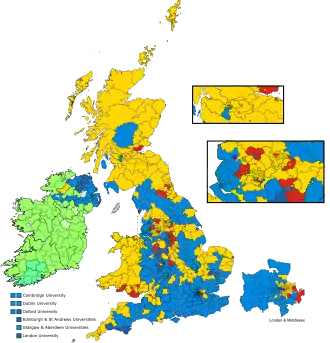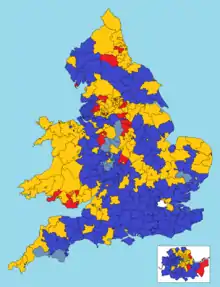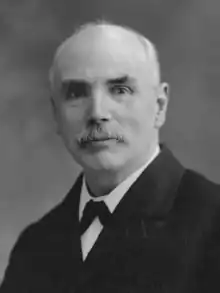December 1910 United Kingdom general election
The December 1910 United Kingdom general election was held from 3 to 19 December. It was the last general election to be held over several days[1] and the last to be held before the First World War.
| |||||||||||||||||||||||||||||||||||||||||||||||||||||||||||||||||||||||
All 670 seats in the House of Commons 336 seats needed for a majority | |||||||||||||||||||||||||||||||||||||||||||||||||||||||||||||||||||||||
|---|---|---|---|---|---|---|---|---|---|---|---|---|---|---|---|---|---|---|---|---|---|---|---|---|---|---|---|---|---|---|---|---|---|---|---|---|---|---|---|---|---|---|---|---|---|---|---|---|---|---|---|---|---|---|---|---|---|---|---|---|---|---|---|---|---|---|---|---|---|---|---|
| Turnout | 81.6% | ||||||||||||||||||||||||||||||||||||||||||||||||||||||||||||||||||||||
| |||||||||||||||||||||||||||||||||||||||||||||||||||||||||||||||||||||||
 Colours denote the winning party | |||||||||||||||||||||||||||||||||||||||||||||||||||||||||||||||||||||||
| |||||||||||||||||||||||||||||||||||||||||||||||||||||||||||||||||||||||
The election took place following the efforts of the Liberal government to pass its People's Budget in 1909, which raised taxes on the wealthy to fund social welfare programmes. The 1909 budget was only agreed to by the House of Lords in April 1910 after the January general election in which the Liberals and the Irish Parliamentary Party gained a majority. The Government called a further election in December 1910 to get a mandate for the Parliament Act 1911, which would prevent the House of Lords from permanently blocking legislation linked to money bills ever again, and to obtain King George V's agreement to threaten to create sufficient Liberal peers to pass that act (in the event this did not prove necessary, as the Lords voted to curtail their own powers).[2]
The Conservative Party, led by Arthur Balfour with their Liberal Unionist allies, and the Liberal Party, led by Prime Minister H. H. Asquith, almost exactly repeated the numerical result produced in the January election, with the Conservatives again winning the largest number of votes. The Liberal Party under Asquith remained in government with the support of the Irish Parliamentary Party. This was the last election in which the Liberals won the highest number of seats in the House of Commons. It was also the last United Kingdom general election in which a party other than Labour or the Conservatives won the most seats.
Results

_UK_parliament.svg.png.webp)
| Candidates | Votes | ||||||||||
|---|---|---|---|---|---|---|---|---|---|---|---|
| Party | Leader | Stood | Elected | Gained | Unseated | Net | % of total | % | No. | Net % | |
| Conservative and Liberal Unionist | Arthur Balfour | 548 | 271 | −1 | 40.4 | 46.6 | 2,270,753 | −0.3 | |||
| Liberal | H. H. Asquith | 467 | 272 | −2 | 40.6 | 44.2 | 2,157,256 | +0.7 | |||
| Labour | George Barnes | 56 | 42 | 5 | 3 | +2 | 6.3 | 6.4 | 309,963 | −0.6 | |
| Irish Parliamentary | John Redmond | 81 | 74 | 5 | 2 | +3 | 11.0 | 1.9 | 90,416 | +0.7 | |
| All-for-Ireland | William O'Brien | 21 | 8 | 2 | 2 | 0 | 1.2 | 0.6 | 30,322 | +0.2 | |
| Social Democratic Federation | H. M. Hyndman | 2 | 0 | 0 | 0 | 0 | 0.1 | 5,733 | −0.1 | ||
| Ind. Conservative | N/A | 4 | 1 | 1 | 1 | 0 | 0.1 | 0.1 | 4,647 | ||
| Independent Labour | N/A | 4 | 0 | 0 | 0 | 0 | 0.1 | 3,492 | |||
| Independent Liberal | N/A | 1 | 0 | 0 | 1 | −1 | 0.0 | 1,946 | |||
| Scottish Prohibition | Edwin Scrymgeour | 1 | 0 | 0 | 0 | 0 | 0.0 | 913 | |||
| Independent Nationalist | N/A | 4 | 2 | 0 | 1 | −1 | 0.3 | 0.0 | 911 | ||
| Independent | N/A | 2 | 0 | 0 | 0 | 0 | 0.0 | 57 | |||
Voting summary
Seats summary
See also
References
- "General Election Dates 1832–2005" (PDF), parliament.uk
- Somervell, D. C. (1936), The Reign of King George V
- All parties shown.
- "General Election Results 1885-1979". Archived from the original on 30 January 2012.
Further reading
- Blewett, Neal (1972), Peers, the Parties and the People: General Elections of 1910
- Craig, F. W. S. (1989), British Electoral Facts: 1832–1987, Dartmouth: Gower, ISBN 0900178302
- Pelling, Henry (1967), Social Geography of British Elections 1885–1910
External links
- United Kingdom election results—summary results 1885–1979 Archived 30 January 2012 at the Wayback Machine
.jpg.webp)


